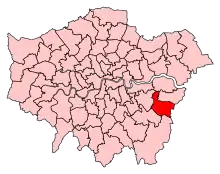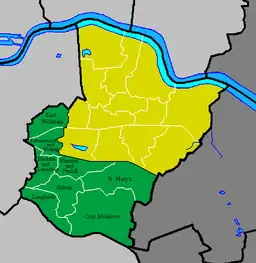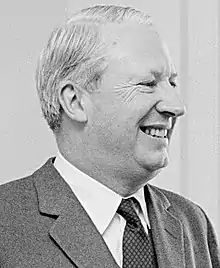Old Bexley and Sidcup (UK Parliament constituency)
Old Bexley and Sidcup is a constituency[n 1] created in 1983 represented in the House of Commons of the UK Parliament since 2010 by James Brokenshire, a Conservative. He is currently the Minister for Security within the Home Office. [n 2]
| Old Bexley and Sidcup | |
|---|---|
| Borough constituency for the House of Commons | |
 Boundary of Old Bexley and Sidcup in Greater London | |
| County | Greater London |
| Electorate | 65,161 (December 2010)[1] |
| Current constituency | |
| Created | 1983 |
| Member of Parliament | James Brokenshire (Conservative) |
| Number of members | One |
| Created from | Bexleyheath (part) and Sidcup |

History and profile
The seat was created in 1983 by combining a small part of the abolished seat of Bexleyheath, chiefly Old Bexley, with the abolished seat of Sidcup.
On 29 January 2008 the Conservative Party withdrew the whip from the MP Derek Conway following alleged misuse of funds revealed by the MPs expenses controversy, who declined to resign as MP and became an Independent. He retired from national politics in 2010.
Sir Edward Heath, (prime minister of the United Kingdom 1970–1974), held this area (also referring to its main predecessor seat, Sidcup) from 1950 until 2001 when he retired at the age of 84, at the time the longest serving MP in the Commons.
- Political overview
The seat has been won at general elections since creation by the Conservative Party candidate. The 1997 New Labour Landslide saw the party's majority fall to its lowest level of 7% of the vote. Its greatest level has to date been 41.5% of the vote — in 1987.
In 2010 the seat was won by the Conservative James Brokenshire, who had transferred to this seat and approved by his local party when his former seat of Hornchurch was abolished in boundary changes. His 2015 result made the seat the 105th safest of the Conservative Party's 331 seats by percentage of majority.[2]
Boundaries
1983–1997: The London Borough of Bexley wards of Blackfen, Blendon and Penhill, Cray, Lamorbey, St Mary's, Sidcup East, and Sidcup West.
1997–2010: The London Borough of Bexley wards of Blackfen, Blendon and Penhill, Cray, Danson, East Wickham, Falconwood, Lamorbey, St Mary's, Sidcup East, and Sidcup West.
2010–present: The London Borough of Bexley wards of Blackfen and Lamorbey, Blendon and Penhill, Cray Meadows, East Wickham, Falconwood and Welling, Longlands, St Mary’s, and Sidcup.
As its name suggests, the seat covers the Bexley and Sidcup areas; it formerly included Danson Park which owing to more development in the south was moved to the Bexleyheath and Crayford constituency.
Constituency profile
Old Bexley and Sidcup has average incomes above the national average,[3] a high proportion of semi-detached and detached homes[4] and low unemployment[5] with a lower than average dependency on social housing.[3]
The constituency generally consists of middle class and lower middle class outer London suburbia. It is served by two railway lines to Central London, Sidcup has been largely developed to neat garden suburb-inspired building schemes for most homes in common with a majority of outer Greater London seats and little of its housing is social housing.
Members of Parliament
| Election | Member[6] | Party | notes | |
|---|---|---|---|---|
| 1983 | Sir Edward Heath | Conservative | Previously sat for Bexley (1950-1974) and Sidcup (1974-1983) Prime Minister of the United Kingdom (1970-1974) Father of the House (1992-2001) | |
| 2001 | Derek Conway | Previously sat for Shrewsbury and Atcham (1983-1997) | ||
| 2008 | Independent | Whip removed | ||
| 2010 | James Brokenshire | Conservative | Previously sat for Hornchurch (2005-2010) Secretary of State for Northern Ireland (2016-2018) Secretary of State for Housing, Communities and Local Government (2018-2019) | |
Elections
Elections in the 2010s
| Party | Candidate | Votes | % | ±% | |
|---|---|---|---|---|---|
| Conservative | James Brokenshire | 29,786 | 64.5 | +3.1 | |
| Labour | Dave Tingle | 10,834 | 23.5 | -5.8 | |
| Liberal Democrats | Simone Reynolds | 3,822 | 8.3 | +5.0 | |
| Green | Matt Browne | 1,477 | 3.2 | +1.5 | |
| CPA | Carol Valinejad | 226 | 0.5 | +0.3 | |
| Majority | 18,952 | 41.1 | +8.8 | ||
| Turnout | 46,145 | 69.8 | -3.0 | ||
| Registered electors | 66,104 | ||||
| Conservative hold | Swing | +4.4 | |||
| Party | Candidate | Votes | % | ±% | |
|---|---|---|---|---|---|
| Conservative | James Brokenshire | 29,545 | 61.5 | +8.7 | |
| Labour | Danny Hackett | 14,079 | 29.3 | +10.3 | |
| UKIP | Freddy Vachha | 1,619 | 3.4 | -14.9 | |
| Liberal Democrats | Drew Heffernan | 1,572 | 3.3 | -0.2 | |
| Green | Derek Moran | 820 | 1.7 | -1.2 | |
| BNP | Michael Jones | 324 | 0.7 | +0.2 | |
| CPA | Chinwe Nwadikeduruibe | 83 | 0.2 | N/A | |
| Majority | 15,466 | 32.2 | -1.6 | ||
| Turnout | 48,042 | 72.8 | +2.0 | ||
| Registered electors | 66,005 | ||||
| Conservative hold | Swing | -0.8 | |||
| Party | Candidate | Votes | % | ±% | |
|---|---|---|---|---|---|
| Conservative | James Brokenshire | 24,682 | 52.8 | −1.3 | |
| Labour | Ibby Mehmet | 8,879 | 19.0 | −0.3 | |
| UKIP | Catherine Reilly | 8,528 | 18.2 | +14.9 | |
| Liberal Democrats | Jennifer Keen | 1,644 | 3.5 | −11.9 | |
| Green | Derek Moran | 1,336 | 2.9 | +2.0 | |
| National Health Action | Bob Gill | 1,216 | 2.6 | N/A | |
| Christian | Laurence Williams | 245 | 0.5 | N/A | |
| BNP | Nicola Finch | 218 | 0.5 | −4.2 | |
| Majority | 15,803 | 33.8 | -1.1 | ||
| Turnout | 46,748 | 70.8 | +1.5 | ||
| Registered electors | 66,035 | ||||
| Conservative hold | Swing | −0.5 | |||
| Party | Candidate | Votes | % | ±% | |
|---|---|---|---|---|---|
| Conservative | James Brokenshire | 24,625 | 54.1 | +4.1 | |
| Labour | Rick Everitt | 8,768 | 19.3 | −8.7 | |
| Liberal Democrats | Duncan Borrowman | 6,996 | 15.4 | +1.5 | |
| BNP | John Brooks | 2,132 | 4.7 | +1.8 | |
| UKIP | David Coburn | 1,532 | 3.4 | −1.2 | |
| English Democrat | Elaine Cheeseman | 520 | 1.1 | N/A | |
| Independents to save Queen Mary’s Hospital | John Hemming-Clark | 393 | 0.9 | N/A | |
| Green | Jonathan Rooks | 371 | 0.8 | N/A | |
| Monster Raving Loony | Napoleon Dynamite | 155 | 0.3 | N/A | |
| Majority | 15,857 | 34.9 | +12.6 | ||
| Turnout | 45,492 | 69.3 | +4.0 | ||
| Registered electors | 65,699 | ||||
| Conservative hold | Swing | +6.4 | |||
Elections in the 2000s
| Party | Candidate | Votes | % | ±% | |
|---|---|---|---|---|---|
| Conservative | Derek Conway | 22,191 | 49.8 | +4.4 | |
| Labour | Gavin Moore | 12,271 | 27.5 | −10.0 | |
| Liberal Democrats | Nick O'Hare | 6,564 | 14.7 | +1.0 | |
| UKIP | Michael Barnbrook | 2,015 | 4.5 | +1.1 | |
| BNP | Claire Sayers | 1,227 | 2.8 | N/A | |
| Independent | Gregory Peters | 304 | 0.7 | N/A | |
| Majority | 9,920 | 22.3 | +14.4 | ||
| Turnout | 44,572 | 65.3 | +3.2 | ||
| Registered electors | 68,226 | ||||
| Conservative hold | Swing | +7.2 | |||
| Party | Candidate | Votes | % | ±% | |
|---|---|---|---|---|---|
| Conservative | Derek Conway | 19,130 | 45.4 | +3.4 | |
| Labour | Jim Dickson | 15,785 | 37.5 | +2.4 | |
| Liberal Democrats | Belinda Ford | 5,792 | 13.7 | −2.4 | |
| UKIP | Janice Cronin | 1,426 | 3.4 | −1.4 | |
| Majority | 3,345 | 7.9 | +1.0 | ||
| Turnout | 42,133 | 62.1 | −13.4 | ||
| Registered electors | 67,841 | ||||
| Conservative hold | Swing | +0.5 | |||
Elections in the 1990s
| Party | Candidate | Votes | % | ±% | |
|---|---|---|---|---|---|
| Conservative | Edward Heath | 21,608 | 42.1 | −18.3 | |
| Labour | Richard Justham | 18,039 | 35.1 | +13.5 | |
| Liberal Democrats | Iain King | 8,284 | 16.1 | +0.2 | |
| Referendum | Brian Reading | 2,457 | 4.8 | N/A | |
| UKIP | C. Bullen | 489 | 1.0 | N/A | |
| BNP | Valerie Tyndall | 415 | 0.8 | N/A | |
| Natural Law | Robert Stephens | 99 | 0.2 | −0.2 | |
| Majority | 3,569 | 7.0 | −31.8 | ||
| Turnout | 51,391 | 75.5 | −6.5 | ||
| Registered electors | 68,079 | ||||
| Conservative hold | Swing | −14.1 | |||
| Party | Candidate | Votes | % | ±% | |
|---|---|---|---|---|---|
| Conservative | Edward Heath | 24,450 | 60.3 | −1.8 | |
| Labour | Donna Brierly | 8,751 | 21.6 | +4.3 | |
| Liberal Democrats | David J. Nicolle | 6,438 | 15.9 | −4.7 | |
| Independent | Barry Rose | 733 | 1.8 | N/A | |
| Natural Law | Robert Stephens | 148 | 0.4 | N/A | |
| Majority | 15,699 | 38.7 | −2.8 | ||
| Turnout | 40,520 | 81.9 | +4.9 | ||
| Registered electors | 49,449 | ||||
| Conservative hold | Swing | −1.4 | |||
Elections in the 1980s
| Party | Candidate | Votes | % | ±% | |
|---|---|---|---|---|---|
| Conservative | Edward Heath | 24,350 | 62.1 | +1.9 | |
| Liberal | Thomas Pearce | 8,076 | 20.6 | −5.4 | |
| Labour | Howard Stoate | 6,762 | 17.3 | +3.5 | |
| Majority | 16,274 | 41.5 | +7.4 | ||
| Turnout | 39,188 | 77.1 | +2.9 | ||
| Registered electors | 50,831 | ||||
| Conservative hold | Swing | +3.7 | |||
| Party | Candidate | Votes | % | ±% | |
|---|---|---|---|---|---|
| Conservative | Edward Heath | 22,442 | 60.2 | N/A | |
| Liberal | Peter Vickers | 9,704 | 26.0 | N/A | |
| Labour | Chris Kiff | 5,116 | 13.7 | N/A | |
| Majority | 12,738 | 34.2 | N/A | ||
| Turnout | 37,262 | 74.2 | N/A | ||
| Registered electors | 50,255 | ||||
| Conservative win (new seat) | |||||
Notes and references
- Notes
- A borough constituency (for the purposes of election expenses and type of returning officer)
- As with all constituencies, the constituency elects one Member of Parliament (MP) by the first past the post system of election at least every five years.
- References
- "Electorate Figures – Boundary Commission for England". 2011 Electorate Figures. Boundary Commission for England. 4 March 2011. Archived from the original on 6 November 2010. Retrieved 13 March 2011.
- List of Conservative MPs elected in 2015 by % majority UK Political.info. Retrieved 2017-01-29
- "Local statistics - Office for National Statistics". neighbourhood.statistics.gov.uk.
- "2011 census interactive maps". Archived from the original on 2016-01-29.
- Unemployment claimants by constituency The Guardian
- Leigh Rayment's Historical List of MPs – Constituencies beginning with "O"
- "Old Bexley & Sidcup Parliamentary constituency". BBC News. BBC. Retrieved 23 November 2019.
- "Old Bexley & Sidcup parliamentary constituency". BBC News.
- http://researchbriefings.files.parliament.uk/documents/CBP-7979/CBP-7979.pdf
- "Election Data 2015". Electoral Calculus. Archived from the original on 17 October 2015. Retrieved 17 October 2015.
- "Election results for Old Bexley and Sidcup, 7 May 2015". 7 May 2015.
- "Old Bexley & Sidcup parliamentary constituency - Election 2017" – via www.bbc.co.uk.
- "Election Data 2010". Electoral Calculus. Archived from the original on 26 July 2013. Retrieved 17 October 2015.
- "Election Data 2005". Electoral Calculus. Archived from the original on 15 October 2011. Retrieved 18 October 2015.
- "Election Data 2001". Electoral Calculus. Archived from the original on 15 October 2011. Retrieved 18 October 2015.
- "Election Data 1997". Electoral Calculus. Archived from the original on 15 October 2011. Retrieved 18 October 2015.
- "Old Bexley & Sidcup [Archive]". www.webarchive.org.uk. Archived from the original on 2012-06-06.
- "Election Data 1992". Electoral Calculus. Archived from the original on 15 October 2011. Retrieved 18 October 2015.
- "Election Data 1987". Electoral Calculus. Archived from the original on 15 October 2011. Retrieved 18 October 2015.
- "Election Data 1983". Electoral Calculus. Archived from the original on 15 October 2011. Retrieved 18 October 2015.
External links
- Politics Resources (Election results from 1922 onwards)
- Electoral Calculus (Election results from 1955 onwards)
| Parliament of the United Kingdom | ||
|---|---|---|
| Preceded by Castle Point |
Constituency represented by the Father of the House 1992–2001 |
Succeeded by Linlithgow |
